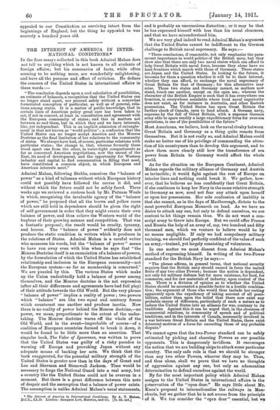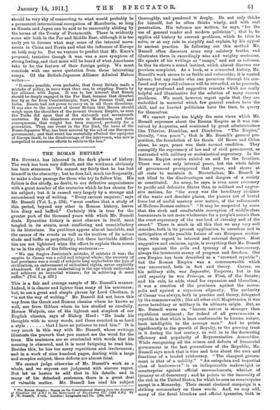THE INTEREST OF' AMERICA IN INTER- NATIONAL CONDITIONS.*
IN the four essays collected in this book Admiral Mahan does not tell us anything which is not known to all students of foreign affairs; but his summaries of facts, while often seeming to be nothing more, are wonderfully enlightening, and have all the purpose and effect of criticism. He defines the concern of the United States in international affairs in these words :-
" The conclusion depends upon a cool calculation of possibilities, an estimate of balances, a recognition that the United States can no longer stand apart, nor proceed safely without a somewhat formulated conception of particular, as well as of general, rela- tions among states. It is a matter of public knowledge, that in certain lines of American policy great care has been taken to act, if not in concert, at least in consultation and agreement with the European community of states ; and this in matters not between us and them, but in which they and we have interests, like, yet independent. This is an implicit admission of entangle- ment in that net known as 'world politics' ; a confession that the United States can no longer accept America and the Monroe Doctrine as the final limitation of her relations to the community of states. We always have had, of course, particular relations with particular states ; the change is, that, whereas formerly these stood apart one from the other, in water-tight compartments as far as concerned American negotiations, now the unrest of the East, its need of development, and the opportunity for Western industry and capital to find remuneration in filling that need, have constituted a common object, in which European and American interests meet."
Admiral Mahan, following Stubbs, conceives the "balance of power" as a kind of talisman without which European history could not possibly have followed the course it did, and without which the future could not be safely faced. Three weeks ago we reviewed a curious book by Mr. Putnam Weale in which, recognising the invaluable agency of the " balance of power," he proposed that all the brown and yellow races which are still held in dependence should be given the right of self-government in order that they might create their own balance of power, and thus relieve the Western world of the bugbear of their growing menace and competition. That was a fantastic proposal; the result would be cruelty, tyranny, and horror. The "balance of power" evidently does not produce the static condition in writers which it produces in the relations of States. Admiral Mahan is a careful writer who measures his words, but the "balance of power" seems to have run away even with him when he says that "the Monroe Doctrine itself is an enunciation of a balance of powers, by the formulation of which the United States has established relationship and inclusion in the European community—not the European system—so far as membership is concerned." We are puzzled by this. The various States which make up the Union undoubtedly hold a balance of power among themselves, and the Monroe doctrine is the net expression (after all their differences and agreements have had full play) of their attitude towards the Old World. But the very phrase " balance of power " implies a reality of power ; two powers which " balance " are like two equal and contrary forces which counteract one another and produce inertia. Now there is no reality of power behind the Monroe doctrine,—no power, we mean, proportionate to the extent of the under- taking. The Monroe doctrine warns off the whole of the Old World, and in the event—improbable of course—of a coalition of European countries formed to break it down, it would be found to be little more than an assertion. That singular book, The Valor of Ignorance, was written to prove that the United States was guilty of a risky paradox in warning off Europe and provoking Japan without any adequate means of backing her acts. We think that the book exaggerated, for the potential military strength of the
United States is greater now than in the days of Grant and Lee and Sherman and Stonewall Jackson. Time would be necessary to forge the National Guard into a real army, but a country like the United States could not be overrun in a moment. But there is a great difference between this note
of despair and the assumption that a balance of power exists. The assumption is unlike Admiral Mahan's usual statements,
• The Interest of America in International Conditions. By A. T. Mahan, P.C.L., LL.D. London : Sampson Low, Marston, and Co. 17s. 6d. net.]
and is probably an unconscious distortion ; or it may be that he has expressed himself with less than his usual clearness-, and that we have misunderstood him.
We are very glad indeed to read Admiral Mahan's argument that the United States cannot be indifferent to the German challenge to British naval supremacy. He says :—
"These conclusions, if reasonable, net only emphasize the pare,. mount importance in world politics of the British navy, but they show also that there are only two naval states which can afford to help Great Britain with naval force, because they alone have no land frontiers which march with those of Germany. These states are Japan and the United States. In looking to the future, it becomes for them a question whether it will be to their interest, whether they can afford, to exchange the naval supremacy of Great Britain fdr that of Germany ; for this alternative may arise. Those two states and Germany cannot, as matters now stand, touch one another, except on the open sea; whereas the character of the British Empire is such that it has everywhere sea frontiers, is everywhere assailable where local naval superiority does not exist, as for instance in Australia, and other Eastern possessions. The United States has upon Great Britain the further check of Canada, open to land attack. A German navy, supreme by the fall of Great Britain, with a supreme German army able to spare readily a large expeditionary force for over-sea operations, is one of the possibilities of the future."
Most Americans, we believe, look on the naval rivalry between Great 'Britain and Germany as a thing quite remote from themselves. But it is not really so, and'Admiral Mahan could make no better use of his privilege of commanding the atten- tion of his countrymen than to develop this argument, and to show them more clearly still how the transference of sea power from Britain to Germany would affect the whole world.
As for the situation on the European. Continent, Admiral Mahan regards the military alliance of Germanj and Austria as invincible ; it would fight against the rest of Europe on
interior lines and nothing could break it. We gather, how- ever, that he believes no less confidently that Great Britain, if she continues to keep her Navy in the same relative strength to Germany as now, need not fear any attack upon herself or upon her possessions. Her sole confession of inability is that she cannot, as in the days of Marlborough, dictate to the most powerful European Monarch on land. As we have no desire to attack any one, but only to defend ourselves, we are content to let things remain thus. We do not want a con- script army to throw into Europe. But we could offer France and Russia the help of an army of, say, two hundred and fifty thousand men, which we venture to believe would be by no means negligible. If only we had compulsory military training, we should feel perfectly confident of the value of such an army,—trained, yet largely consisting of volunteers.
In one matter we must dissent from Admiral Mahan's method of expressing himself. In writing of the two-Power standard for the British Navy lie says :—
" The phrase affirms, in general terms, that national security requires that the British navy should exceed in force the united fleets of any two other Powers ; because the nation is dependent, not only for military defense but for mere existence, for food, for commerce, and for raw materials of industry, upon control of the sea. There is a division of opinion as to whether the United States should be accounted a possible factor in a hostile combina- tion; the argument of those who would thus include her resting apparently upon the expediency of taking account of all possi- bilities, rather than upon the belief that there now exist any probable causes of difference, particularly of such a nature as to induce the United States into an alliance for war, contrary to its traditions. Against this it can be urged that, in the closeness of commercial relations, in community of speech and of political traditions, and in the interests of Canada, necessarily involved in a war between Great Britain and the United States, there exist deterrent motives of a force far exceeding those of any probable dispute."
We cannot agree that the two-Power standard can 'be safely estimated by picking and choosing Powers as our possible opponents. This is dangerously invidious. It encourages the notion that we are building ships to attack some particular
country. The only safe rule is that we should be stronger than any two other Powers, whoever they may be.. Thus, and thus 'alone, shall we prove that we have no thoughts of aggression 'against any one, but only an adamantine determination to defend ourselves against the world.
• By far the most important policy which Admiral Mahan assigns- to the United States in international affairs is the praservation of the "open door." He says little about Mr. Knox's proposal to internationalise the railways in. Man- churia, but we gather that he is not averse from the principle of it. We too consider the "open door" essential, but we
should be very shy of consenting to what would probably be a permanent international occupation of Manchuria, so long as Russia and Japan can be said to be reasonably abiding by the terms of the Treaty of Portsmouth. There is evidently some stir both in the Far and Middle East, although it is too early yet to foresee what may come of the internal move- ments in China and Persia and what the influence of Europe on both may be. But we venture to predict that Mr. Knox's proposal, tentative though it was, was a sure symptom of strong feeling, and that more will be heard of what Americans take to be the feature of their foreign policy. We must conclude with one more quotation from these interesting essays. Of the British-Japanese Alliance Admiral Mahan writes :-
" It seems possible, even probable, that Great Britain made a mistake of policy, in more ways than one, in crippling Russia by her alliance with Japan. It was to her interest that Russia should be deeply engaged in the Far East, because that diverted her by so far from Constantinople, Suez, the Persian Gulf, and India,. Russia had not power to carry on in all these directions. It was also to the interest of Great Britain that Russia should weigh upon the shoulders of the present German Empire, as once the Turks did upon that of the sixteenth and seventeenth centuries. By the disastrous events in Manchuria, and their consequences, that weight has been removed, probably for a generation. Thus one event in the Far East, the issue of the Russo-Japanese War, has been assured by the act of one European government ; and that event has materially affected the equipoise of Europe itself, to the disadvantage of the intervener, who now is compelled to enormous efforts to retrieve the loss."







































 Previous page
Previous page